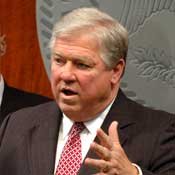Monday, December 19, 2011
Gov. Haley Barbour is singing the praises of skills training programs at community colleges and high schools while warning of future budget cuts to education. Barbour spoke during his conference on work-force development Dec. 8. The conference was the second in a series of "Keep Mississippi Moving" speeches that Barbour is giving during his last full month as governor.
"In the process of improving work force development, we have begun to de-stigmatize skills training, which was long overdue," Barbour said. He added that expecting every student to go to college sets many students up for failure. "University is not for everybody. But importantly, tens of thousands of our young people can and do and will continue to have great careers with high earnings and wonderful lives because of the skills that they've learned in work-force training."
Barbour said the economy needs more workers with skills in industrial jobs, construction, software and similar fields than people with college degrees. He called for introducing skills training in middle schools, when some students are thinking about dropping out.
Community colleges are especially important to training Mississippi's work force, Barbour said, through trade programs as well as remedial classes to help high school graduates who are not ready for college classes. But community colleges can expect state appropriations to be reduced next year, he said.
Barbour suggested that community colleges consolidate some of their administrative services. He said the state should reduce or eliminate funding for athletic programs at community colleges and universities. Fans and alumni should pay for intercollegiate athletic programs, not taxpayers, he said.
Colleen Hartfield, vice president for community relations at Hinds Community College, said she is pleased the governor recognized the contributions that community colleges make. "We very much view what we to at the community college as job creation, because people come to the community college to train for a career," she said. Still, Hartfield said community colleges have already taken a hit from repeated cuts in state funding.
Since 2000, Hartfield said state funding for community colleges has declined by 24 percent, even as enrollment has increased by 50 percent. That means tuition and student fees have to make up a larger percentage of the schools' budgets. "A concern that we have is with further cuts in state funding, the community colleges' affordable tuition will become less affordable," she said.
Community college classes are typically much less expensive than those at a university--one of the reasons Barbour gave for increasing enrollment at community colleges. "Our concern is if the community college access is limited by rising tuition costs, there's no way that the state is going to reach its goal of a more educated work force," Hartfield said.
Some of Barbour's money-saving suggestions recalled his proposals in years past for colleges to consolidate some of their services, and K-12 districts to draw from their cash reserves to cover some of their costs. A 2008 examination by the state auditor found, however, that most school districts said they cannot afford to set aside revenue for a rainy-day fund.
Barbour called for investment in work-force development to attract factories for companies such as Nissan and Toyota. "Work-force development and student aid is the area of education where we spend the least of our huge education budget, but it is the education sector which pays off the fastest," he said.
Currently, the budget for K-12 education is about $250 million less than state law requires. Although the law requires the Legislature to "adequately" fund education according to a specific formula, it rarely does.
Barbour also said "illegitimate" births to teen mothers contribute to low education levels. "The vast majority of failing students are first being failed at home," he said.
The governor said churches and others in the community should get involved in reducing the dropout rate. Currently, Jackson Public Schools' graduation rate is 63.6 percent. Barbour said churches should commit to educating students both inside and outside of their congregations by helping them study and encouraging them to stay in school. He also said churches should support and mentor mothers as they try to help their children succeed in school.
Comment at http://www.jfp.ms.

Comments
Use the comment form below to begin a discussion about this content.
Sign in to comment
Or login with:
OpenID